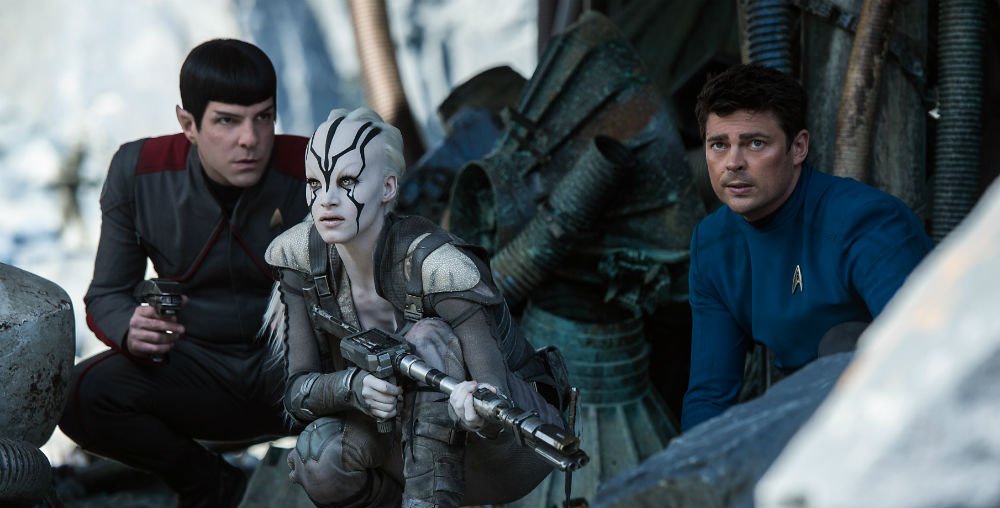Some folk who watched the first trailer for Star Trek Beyond a few months back may well have taken immediately to their favourite social media platform. Not to get excited, mind, but to scream heaven-ward regarding the use of Beastie Boys’ Sabotage soundtracking a bombastic, action-centric clip montage with Captain Kirk riding a motorcycle through the air.
In a furore that speaks volumes about society’s arse/tit priorities, this was tantamount to sacrilege; how dare the director of Fast & Furious piss all over Gene Roddenberry’s creation so as to possibly attract a wider demographic than the Comic-Con faithful! God forbid a Star Trek film should actually appear fun and appealing to persons outside of its immediate fanbase! Even Simon Pegg – the film’s co-writer – felt compelled to apologise such was the hubbub, reassuring fans that the film was indeed better than the trailer may have suggested. Honestly, if this was enough to get sci-fi fans in a lather, imagine if they remade Ghostbusters but with WOMEN. I dread to think.
Suffice to say, the use of said track wasn’t dreamt up by some cynical marketing department. Minor Spoiler Alert: it actually features in the finished film. And not in some throwaway manner; it’s a key component to a pivotal, colossal-scale action sequence. And would you believe it, I had a grin on my face a mile wide watching it.
You see Star Trek Beyond isn’t big nor necessarily clever filmmaking. But Pegg and co-writer Doug Jung have continued what J.J. Abrams started; making exciting, engaging, populist popcorn cinema out of a property that had all but become the sole reserve of bedroom-dwelling teenage boys. It may not have quite the flare of Abrams behind the lens (oh I went there with that wordplay), but what it may lack in panache it more than makes up for in heart.
Whereas 2009’s Star Trek and 2013’s Into Darkness focused primarily on the tense but brotherly relationship between Kirk (Chris Pine) and Spock (Zachary Quinto), Beyond finds the crew of the Enterprise fractured entirely. After responding to a distress call to rescue a stranded ship, the Enterprise is set upon by a swarm of craft that tear it to pieces (my dad was incredibly confused by this in the cinema, recalling the ship’s destruction in Star Trek III: The Search for Spock. I quickly and quietly explained that this was an alternate timeline, but then realised I knew more about Trek than I had previously acknowledged; I swiftly fell silent in an attempt to enjoy the rest of the film).
Realising the distress call was merely a set-up for the attack, the crew – now splintered into several pairings after a spectacular crash-landing – attempt to both fend for themselves and regroup to fight the enemy, headed up by the sufficiently nasty Krall (Idris Elba). Of these pairings, Spock and Bones (Karl Urban) make for some #classicbants while Scottie (Pegg) and Jaylah (Sofia Boutella) offer some light relief without the former turning into a comic caricature (it’s a tightrope in places, but Pegg never falls off). It’s testament to Pegg’s writing that he can even find time to wangle in Spaced references (Kirk requesting Scotty “skip to the end”) without it seeming shoehorned.
Whilst Beyond is by no means perfect (Elba’s villain gets suspiciously hammy towards the end, even for a Trek film), it does for Trek what Skyfall did for Bond on its respective 50th anniversary; references and in-jokes are in abundance, but never to the detriment of the film as a whole. It knows it has to service an audience that couldn’t care less about the previous exploits of Spock and Chekhov, whilst also having a weight of fan expectation slung around its shoulders that could have easily been its undoing. (It’s worth noting that tributes both within the film and during its end credits are paid to Leonard Nimoy, the original Spock who passed away during production, and Anton Yelchin who died tragically on June 19th this year aged just 27. It’s already been said that Yelchin's Chekhov won’t be recast, which makes it interesting to see how they'll take the franchise forward in this respect alone.)
As previously noted, Justin Lin is perfectly serviceable as a director – and maybe that’s no bad thing, as he brings no known Trek desires to the table. Sam Mendes proved with Spectre that if you try and twist a franchise to your own ends, i.e. creating a ‘Bond: Greatest Hits’ compilation, it can be your undoing (not that Eon Productions are too bothered in that particular respect, Spectre earning almost $900m worldwide). Lin lets the characters and story do the talking, sticking to the course Abrams has laid out (albeit with less lens flare) without trying to do anything crazily new. Then again, who did the forum trolls blame for Sabotage synched to footage of Kirk on a motorcycle…? As it turns out, I think we can safely blame the writers rather than Mr. Fast & Furious. But knowing how big my grin was when those guitars kicked in, I’d be taking all the blame I could.

No comments:
Post a Comment